

What is The Salvation Army?
The Salvation Army is a Christian church and registered charity seeking to share the good news of Jesus and nurture committed followers of him. We also serve people without discrimination, care for creation and seek justice and reconciliation. We offer practical support and services in more than 700 centres throughout the UK. Go to salvationarmy.org.uk/find-a-church to find your nearest centre.
What is the War Cry?
The Salvation Army first published a newspaper called the War Cry in London in December 1879, and we have continued to appear every week since then. Our name refers to our battle for people’s hearts and souls as we promote the positive impact of the Christian faith and The Salvation Army’s fight for greater social justice.
From the editor’s desk
At least one in six children lives with additional needs, such as a physical or cognitive disability or other health problems that impact their ability to undertake everyday activities. That’s according to the Christian charity Growing Hope.
As we report in this week’s issue, the organisation provides support to some of those children – along with their wider family. The work, often carried out in conjunction with churches in the communities where the families live, is making a positive impact, particularly in what can be challenging times.
Initially it can be devastating for a parent to be told that their child has additional needs. In another article, Rachel Gotobed talks to us about life with her daughter, who received a diagnosis of autism at the age of four.
‘I think that the despair I experienced was down to my fear of the unknown,’ Rachel tells us. ‘What would the future look like? How would we deal with it?’
That diagnosis came 20 years ago.
‘What the years have revealed is that life is deeper, better and fuller because of having journeyed this path,’ Rachel says. ‘I have met some amazing people in the autistic community – both professionals who have helped us and other families who are in similar situations to ours.

Editor: Andrew Stone, Major
Deputy Editor: Philip Halcrow
Staff Writer: Emily Bright
Staff Writer: Claire Brine
Staff Writer: Ewan Hall
Editorial Assistant: Linda McTurk
Graphic Designer: Mark Knight
Graphic Designer: Natalie Adkins
Email: warcry@salvationarmy.org.uk
The Salvation Army
United Kingdom and Ireland Territory
1 Champion Park London SE5 8FJ
Tel: 0845 634 0101
Subscriptions: 01933 445445 (option 1, option 1) or email: subscriptions@satcol.org
Founders: Catherine and William Booth International leaders: General Lyndon Buckingham and Commissioner Bronwyn Buckingham
Territorial leaders: Commissioners Jenine and Paul Main
Editor-in-Chief: Major Julian Watchorn
ISSN 0043-0226
The Salvation Army Trust is a registered charity. The charity number in England, Wales and Northern Ireland is 214779, in Scotland SC009359 and in the Republic of Ireland CHY6399. Printed by CKN Print, Northampton, on sustainably sourced paper
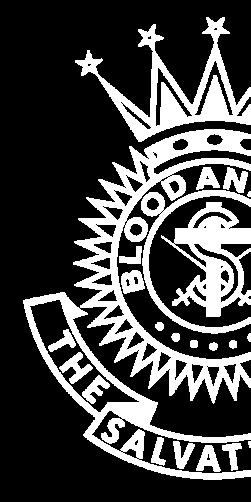

‘Having a daughter who is different has also meant that I’ve learnt to see the world differently.’
Rachel’s experiences have also been greatly impacted by her Christian faith, which has supported her throughout her life.
‘Over the years, I have definitely learnt new heights and depths of God’s love,’ she says. ‘I know that he loves us not for what we do, but for who we are. I know that I’m able to walk this path because of who God is in me.’
Christians take great comfort and strength from knowing that they are loved by God and that he is with them in all circumstances. The great news is that, whatever our own needs may be, God is able – and willing – to meet them, if we’ll turn to him.
When you’ve read the War Cry, why not pass it on ➔ ➔ ➔
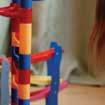


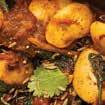
Partners in crime
As Sam (Jodie Whittaker) arrives at a Spanish prison, apprehension is plastered all over her face. When the gates swing open, her friend and fellow fraudster Bert (Suranne Jones) walks out after 10 years of incarceration. It’s an awkward reunion – the pair haven’t seen each other since Bert was imprisoned. Sam – partly out of guilt – agrees to let Bert stay with her, because she knows that her former partner in crime is being released on compassionate grounds. Because of an inoperable liver tumour, Bert only has months to live. With nothing left to lose, she’s planning to make every day count.
But Bert’s criminal inclinations, combined with unresolved tensions from the past, quickly push Sam to breaking point.
Over the past decade, Sam has worked hard to keep a low profile as a lawabiding citizen. But within hours of Bert’s release, she becomes an accomplice in criminal activity. And, to make matters worse, Bert is already planning one last
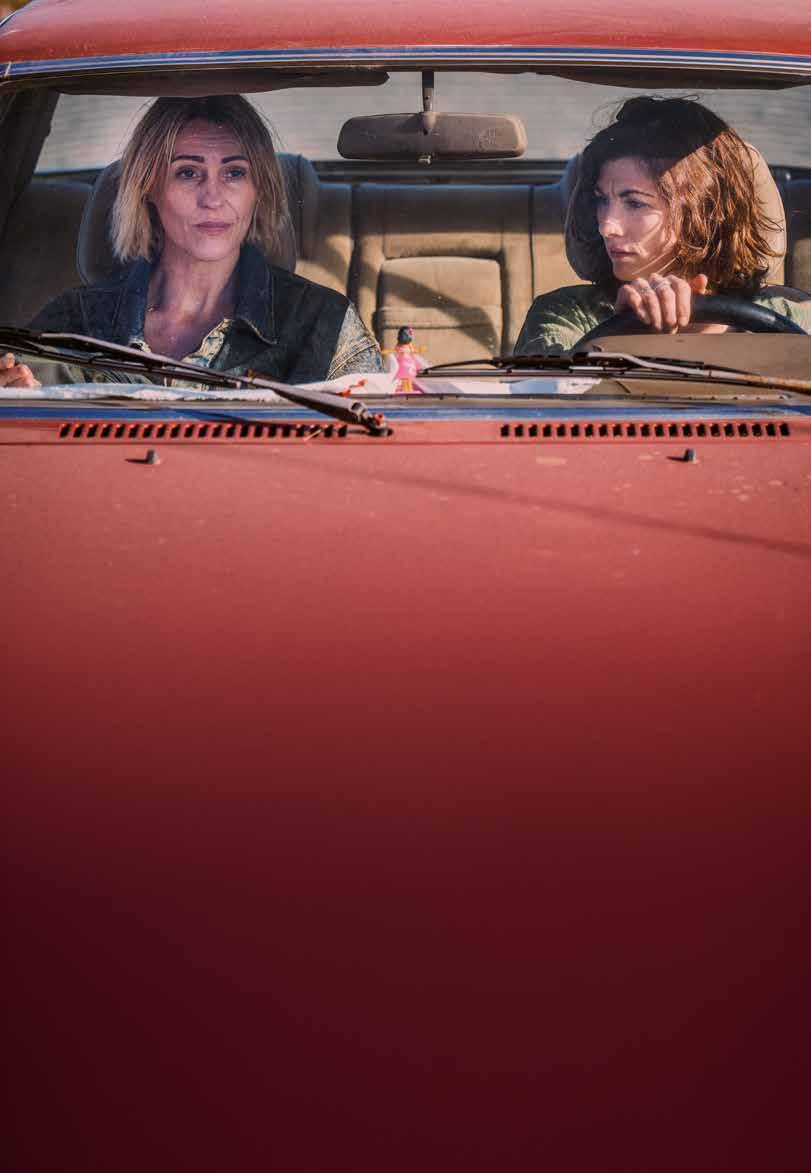
heist – stealing a Salvador Dali artwork worth a six-figure sum from Madrid’s Reina Sofía museum. She wants Sam to help her.
Sam is torn. She knows that the friendship is toxic and that the heist could end very badly. Yet their shared history and her personal motivations draw her in. Sam has a life-defining decision to make. Does she stay out of trouble? Or will she take part in the robbery, which could set her up financially for the rest of her days?
At a press event in London, Suranne Jones explained the complications that come with Bert, the character she plays, and the role that corrupting influences can have in our lives.
‘She obviously unlocks something in Sam that’s great, but then Sam feels really dirty afterwards,’ she said. ‘I’ve always thought that Bert is like an addiction – it can be replaced with alcohol or drugs. You’ll feel amazing, and you can achieve brilliant things. But not for very long, because there are consequences.’
Many viewers can perhaps relate to
Heisty decision could end badly for former con woman
TV preview: Frauds Sundays and Mondays ITV1 and ITVX
By Emily Bright
having a Bert in their own lives. It might not be a toxic friendship – it could be any kind of temptation to do something that they know, deep down, is wrong.
We’re not alone – struggling to make the right moral choices is, and always has been, part of the universal human experience.
Thousands of years ago, a poet wrote: ‘The food you get by cheating may taste delicious, but it turns to gravel’ (Proverbs 20:17 Contemporary English Version). By that, they meant that taking immoral shortcuts would lead to serious consequences later on, and that the dishonest person would live to regret their choices. But in a later verse, they offered a solution to staying out of trouble: ‘Trust the Lord, and he will help you’ (20:22).
The struggle to resist something both alluring yet immoral can sometimes feel overwhelming. But with God’s help, we can stand firm and make the right choices. We’ll never regret turning to God for his support and strength. A relationship with him is a treasure that lasts a lifetime.
Bert and Sam reunite after 10
j TEA M TALK
Concrete truths
Emily Bright gives her take on a story that has caught the attention of War Cry reporters
Emma Watson is ‘the happiest and healthiest’ she’s ever been after taking a break from acting, she told Hollywood Authentic magazine.
The Harry Potter star explained that maintaining ‘the weight of a public persona, that sort of needs constant feeding and sprucing and glamorising’ was ‘very energy intensive’. And she discovered that stepping away from work has ‘freed up so much space… to be a better sister, daughter, friend, granddaughter and then artist’.
By realigning her work-life balance, Emma has been able to figure out what defines her. ‘The most important thing really – or the foundation of your life – is your home and friends and family,’ she said. ‘I think I worked so hard for so long that my life sort of bottomed out… So I needed to go and do some construction work. Some good foundations for anything else to grow from.’
God is my rock and refuge
Emma makes valid points about prioritising what truly matters in life. Friends – and particularly family – have played a starring role in my own wellbeing. But her words also made me reflect on other good foundations that I’ve built my life upon.
One cornerstone is my Christian faith. Since childhood, the Bible has provided me with clear guidance on how to live well by loving God and other people.
Jesus, God’s son, once told his followers that ‘everyone who hears these words of mine and puts them into practice is like a wise man who built his house on the rock. The rain came down, the streams rose, and the winds blew and beat against that house, yet it did not fall, because it had its foundation on the rock’ (Matthew 7:24 New International Version).
Those words have rung true for me. When I’ve faced my hardest times, I’ve relied on the wisdom of God’s word and have run to him in prayer as my rock and refuge. My relationship with God has been the most solid foundation of my life. Thanks to him, I’m still standing.
The exciting truth is that anyone can build a relationship with God. It’s definitely worth freeing up space to read the Bible and discover him for ourselves.
WAR talk talk Team talk Team talk ‘ ’
Cathedral displays Magna Cartas
The only surviving 1216 Magna Carta is being exhibited at Durham Cathedral Museum.
On display until 2 November, the exhibition Magna Carta and the North also features the 1225 and 1300 Magna Carta and three Forest Charters.
The documents are part of a wider cathedral experience that includes contemporary artworks and interactive installations exploring the Magna Carta’s legacy as a symbol of justice and democracy. Often seen as one of England’s most famous documents, it laid the foundation for modern democracy by establishing that the King is subject to law.
The exhibition also explores how the Magna Carta connects to the Christian faith, inviting visitors to pause, light a candle or take a prayer card.
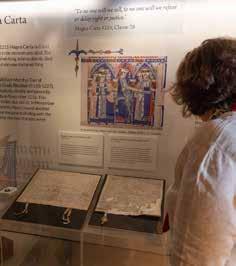
A visitor in Durham Cathedral Museum looking at the only surviving 1216 Magna Carta
DURHAM
CATHEDRAL
WAR CRYWnRLD
Biblical inspiration for TV drama writer
David Ireland, the creator of ITV’s that he started writing the programme during the Covid lockdown of 2020, at a time when he was ‘obsessively reading the Bible’.
After explaining that the series is about ‘a man running away from himself and running away from God’, David told the magazine about his own journey to faith.
He said: ‘Around the time I was writing the first episode, I started praying and all I can say is that something happened. I had some kind of experience that changed me and made me want to read the Bible and go to church.
‘Now, every morning before work, I read four or five chapters of the Bible.’
Andrew Lincoln, who plays John in the series, also told the magazine about his own take on faith.
‘I’m deeply moved by being inside a church,’ the actor said. ‘I understand and I respect people’s devotion.’
Andrew added that he is ‘jealous about their practice and how family and community is absolutely epicentre of a lot of worship in the world’.
Soccer stars team up


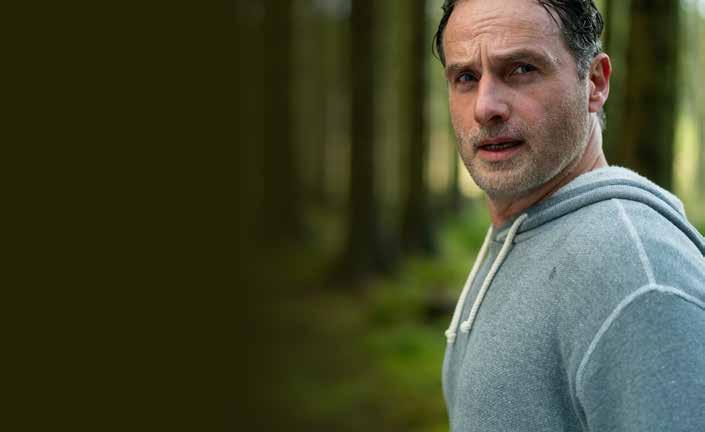
Sweet support for runners
The Salvation Army in Norwich brought support and encouragement to thousands of runners at this year’s Run Norwich 10K.
Two England footballing legends, Manchester City’s Kalvin Phillips and former professional footballer and manager Stuart Pearce, joined forces last month to cheer on players at a football tournament for people experiencing homelessness.
The Salvation Army’s 14th annual Partnership Trophy brought 25 teams together from its services around the United Kingdom to play in a competitive five-a-side tournament helping to raise awareness of homelessness, boost morale and improve wellbeing and mental health.
After Donny Dazzlers from Doncaster Foyer won the competition, Nathan Slinn, deputy director of Homelessness Services, said: ‘What a fantastic day today, one of teamwork and celebration and reinforcing our mission of providing so much more than just a roof for people experiencing homelessness.
‘Pearce and Phillips really gave a boost to everyone involved. We send our heartfelt thanks to them.’
Volunteers from the Norwich Citadel church handed out sweets and provided music from their brass band.
A second stand on the course offered refreshments and friendly conversation, helping to raise awareness of the church’s services.
‘We hope people recognise us as a Church first and foremost,’ said organiser Martin Carr. ‘But also as an organisation that supports the community around the city centre and beyond.’
Stuart Pearce and Kalvin Phillips
Andrew Lincoln
‘There is a growing crisis with additional needs’
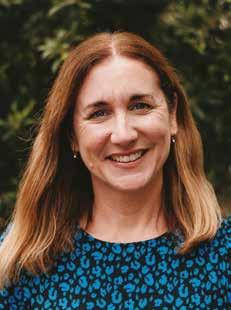
VICKI SMITH of Growing Hope describes how the charity offers free therapy for children and young people with additional needs.
Interview by Ewan Hall
At least one in six children in England has an additional need.
That’s according to the Christian charity Growing Hope, an organisation which offers free therapy to children and young people who require help with a physical or cognitive disability, a mental health problem or an undiagnosed need that impacts their participation in everyday activities.
‘You only have to read the news to know there is a growing crisis with
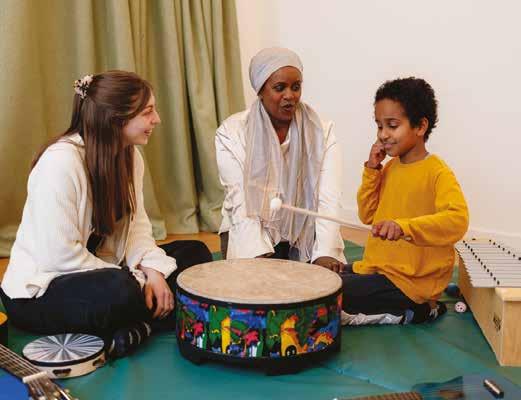
additional needs. The support systems that are in place just can’t keep up with the number and level of demand,’ says Vicki Smith, the interim CEO of the charity.
Growing Hope highlights that having a child with a neurodiverse condition affects the whole family – including any siblings. Three in four parents or carers leave work or cut their hours in order to provide extra support, while two in five siblings of children with additional needs face mental health challenges.
In response to the growing demand for help, the charity has opened three new clinics this year. Many of the charity’s clinics operate in church buildings and are supported by church funding and community involvement.
The clinics are desperately needed by the families.
‘We had one case where a mother and child came for therapy sessions,’ recalls Vicki. ‘The child was experiencing huge meltdowns at home because they were unable to regulate their emotions. The smallest change, or even activities like having a bath, would set them off. The mother was managing all this on her own with another younger child to look after as well.
‘We worked with her child on functional goals, looking at how we could encourage them to find tools and strategies to regulate their emotions.
‘An occupational therapist will typically
Vicki Smith
A child takes part in music therapy
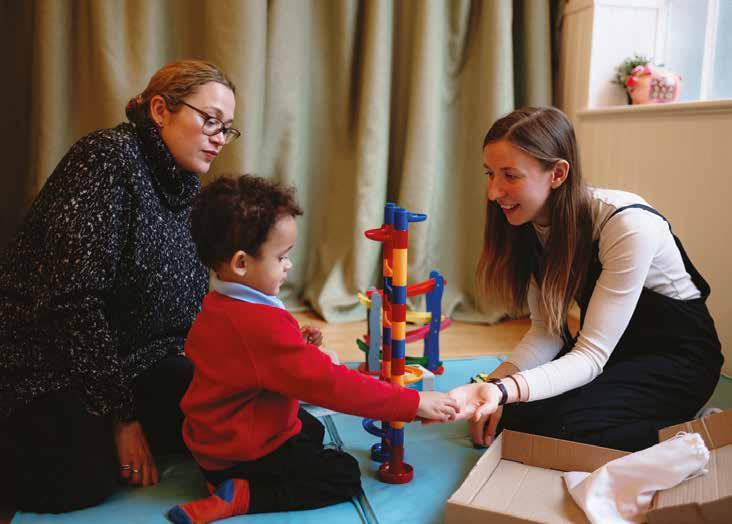
use movement-based activities. They might play games using a swing, or a scooter board where the child lies on their tummy and uses their arms to pick up objects and move across the room.’
Having been shown how to regulate their emotions, that child is still using the techniques today and, as Vicki explains, that wasn’t the only help they were given.
‘Another functional goal the child achieved was how to do their buttons up,’ she says. ‘They had lots of challenges with fine motor skills and struggled with buttons, which typically other children their age could do. This left them feeling isolated and behind their peers. But, over time, they learnt to fasten them and their mum said to us: “Every time I see them doing their buttons, I think how they learnt that at Growing Hope and I am so grateful.”’
Growing Hope also runs free lunchtime parent training sessions over Zoom. These are run to educate parents, carers and anyone interested in learning more about therapeutic techniques.
‘The sessions rotate between different specialists who work in the clinics,’ says Vicki. ‘One week it might be led by an occupational therapist, and the
next a speech and language, music or art specialist. Each session focuses on a specific topic. I went to one session where our speech therapist explained how children learn to form sounds and how delays can be addressed.’
This online service is available to all and includes sessions from outside speakers such as education lawyers.
We can bring these families hope
But the support available isn’t just restricted to the formal sessions. Families are offered prayer and are given an invitation to attend the partner church, providing them with the opportunity to connect to a larger community.
‘At the end of one session,’ says Vicki, ‘the therapist asked: “Is there anything I can pray for?” and the mum said: “Well, I need to know who Jesus is.”
‘As a child, this mother had lived in a remote part of China. Planes had flown over dropping Bibles into her town, so she had little moments of hearing about Jesus but never fully understood who he was. Coming to Growing Hope was her
opportunity to hear the gospel. She went to the church and the first person she met could talk to her in Cantonese. She is now a part of a church community. So, not only has her child been helped, but she has also found faith, hope and community.’
Vicky’s motivation to support families stems from her own experience of raising a child with additional needs – a journey that often felt isolating and emotionally challenging, even with supportive friends and family around her. Feeling on the fringes of typical family life gave her a deep understanding of the struggles many parents face.
Vicky’s faith played a key role in guiding her towards Growing Hope, where she saw an opportunity to combine her lived experience and professional background to make a meaningful difference.
‘I joined the charity as its head of training and development and have moved into various roles,’ she says.
‘But it was really about personal, lived experience and my passion for children and families – especially vulnerable ones – that linked with my faith.
‘I believe Jesus brings hope. And we can bring these families hope through what we do.’
Growing Hope offers a wide range of therapies and counselling
‘Through their difference, autistic people bring something beautiful to our world’
RACHEL GOTOBED reflects on the joys and challenges of raising her autistic daughter and explains why she is trusting God for
Interview by Claire Brine
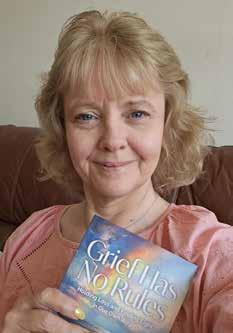
Rachel Gotobed
When Rachel Gotobed stumbled across a Facebook post inviting writers to share their stories of grief for inclusion in a new book, she was intrigued. And after a conversation with Cassie Swift – the lead author driving the project – she decided to write a chapter about life with Hannah.
‘I chose to write not about death but to look at a different situation which also brings feelings of loss,’ says Rachel, who is one of ten writers to contribute towards the book Grief Has No Rules. ‘As a parent whose daughter is autistic and learning disabled, I have felt over the years something akin to grief as I have had to face up to a loss of expectations.
‘When you are expecting a baby, I think you have an idea about how their life will go. You imagine that they will meet their developmental milestones and get on well at school. But when a child is identified as
the future
not following that “norm”, a parent has to keep coming to terms with those losses of expectations.
‘When Hannah was diagnosed as autistic, it wasn’t a case of: “Oh, now that we know that, everything is suddenly OK.” Coming to terms with her autism and how it affects her and our family is a continual process.’
Rachel’s daughter Hannah is now 23 years old and enjoys singing, completing jigsaws, going on Disney holidays with her family and collecting LOL dolls. She has an encyclopaedic memory of dates and places. She takes comfort in her structured daily routines, which include watching the entirety of BBC1’s Breakfast before she leaves the house in the morning. She also enjoys attending a college in Leeds for young adults with additional needs.
‘Like most 23 year olds, Hannah
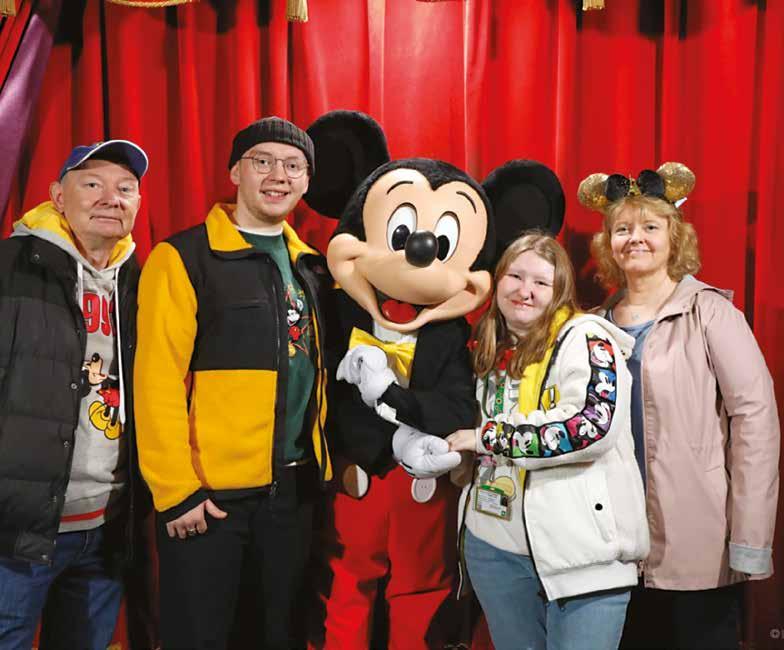
doesn’t want to be treated like a child,’ says Rachel, who also works in The Salvation Army’s family ministries department. ‘But the difference is that a lot of the things she loves are enjoyed by much younger people. The items on her Christmas list this year will not be what most 23-year-old women would want.’
When Hannah was a child at primary school, it became clear to her teachers that she would benefit from transitioning from mainstream education into special education. Making the decision to separate her from her older brother, Jacob, who was in a class a couple of years above, marked a significant step that Rachel and her husband Adrian initially found difficult to come to terms with.
‘But we made a conscious decision not to compare Hannah to others and to celebrate her achievements whether
they were academic or not,’ she says. ‘Yes, when I saw parents of her peers celebrating their child’s GCSE results on social media, I had to take a lot of deep breaths. But when we looked at the overall picture, we could see that life was about so much more than education.’
I asked: ‘Why Hannah? Why us? Why our child?’
Though Rachel writes in the book of a parent’s need for ‘ongoing acceptance’ when raising an autistic child, she admits to the personal struggles she faced at the moment of Hannah’s diagnosis, which she received when Hannah was just four years old.
‘The differences between Hannah and other children had become more apparent
to me when she was about three,’ says Rachel. ‘But I thought: “I’m OK with this. Whatever happens next, God’s got it in hand and we will handle it together.” But when the diagnosis came, it felt so much bigger than what I’d envisaged. And what I thought I would (or should) feel at that point was far removed from the reality of what I actually felt.
‘I think that the despair I experienced was down to my fear of the unknown. What would the future look like? How would we deal with it? I never doubted my faith in God or his care for us, but I did ask: “Why Hannah? Why us? Why our child?”’
Over the years, Rachel believes that some of her difficult questions have been answered. And she has also found that being part of the autistic community
Turn to page 10 f
Adrian, Jacob, Hannah and Rachel enjoy meeting Mickey Mouse on a Disney holiday
has brought blessings that she wasn’t expecting.
‘What the years have revealed is that life is deeper, better and fuller because of having journeyed this path,’ she says. ‘I have met some amazing people in the autistic community – both professionals who have helped us and also other families who are in similar situations to ours.
‘Having a daughter who is different has also meant that I’ve learnt to see the world differently. It’s taught me about a deeper love, a love that is more sacrificial –because it has to be.
‘Everything that Adrian and I do has to be planned around Hannah’s care needs. We have missed special occasions like weddings and parties because Hannah wouldn’t be able to cope with them, and there were times when we had to take Jacob on outings separately, leaving Hannah behind. In both situations, it’s always hard having to make choices that we don’t want to make.
‘But, as parents, we have to be willing to do things differently from the people around us, in order to ensure that our child has everything she needs to feel loved and cared for. We cope because we just do.’
Through raising Hannah, Rachel feels that she has also gained a greater
understanding of God’s parental love for humankind.
‘I believe that the depth of my love as a parent, the sacrifices I’m willing to make and the choices I have to take reflect the Father-love of God,’ she says. ‘And if I can love my child this much, then how much more must God love us?
‘Over the years, I have definitely learnt new heights and depths of God’s love. I know that he loves us not for what we do, but for who we are. I know that I’m able to walk this path because of who God is in me.
‘I can’t imagine parenting Hannah without having my faith. It’s what spurs me on to forgive people who say things about autism out of fear or ignorance. It encourages me to fight for those people who don’t have a voice. Where possible, I’ve always tried to use my experiences with Hannah as a learning space.’
Rachel’s desire to educate people who know little about autism has resulted in some interesting discussions. When asked once if she thought that Hannah would still be autistic in Heaven, Rachel
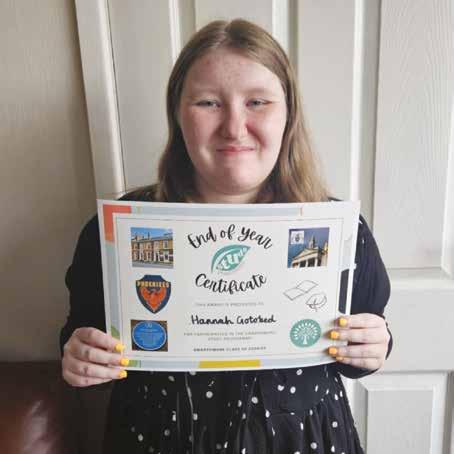
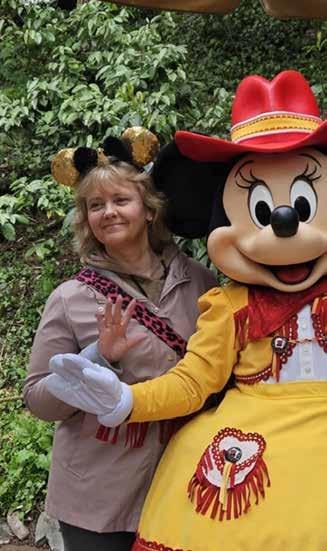
replied with a resounding yes.
‘Hannah doesn’t need healing,’ she explains. ‘There is nothing wrong with her. She is whole as she is. She’s just different – and the world needs that difference.
‘Some of the world’s best inventors and innovators have been neurodivergent. We can see it through their creativity and attention to detail. Their perseverance and single-minded focus. I believe that autistic people like Hannah bring something beautiful to our world. Sometimes what they bring is unexpected and it’s not always an easy journey. But we are better for having and knowing autistic people. God knows that we need them and the ways in which they show us to think differently.’
Hannah receives a certificate for her achievements at college
As well as reflecting on what she has learnt from the past, Rachel uses her chapter in Grief Has No Rules to touch on the future and what life might look like for Hannah when she and Adrian are

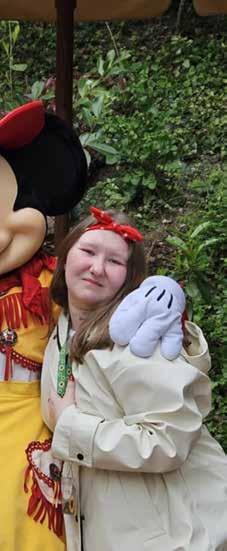
no longer around. She admits that it’s a frightening reality to think about, but is quick to take comfort from her faith.
God loves Hannah even more than I do
‘Condensing Hannah’s story into one chapter of a book and then reading it through has meant that I’ve been able to see the faithfulness of God through everything,’ she says. ‘He has always guided us and opened doors. While I cannot begin to imagine what the future will look like, I remember that God has done so much for us before – and I know that he will do it again. He loves Hannah even more than I do, and is already working for her good. When I cling on to that truth, I believe everything will be OK.’ Such a message of hope is one that
she would like all parents of children with additional needs to hear.
‘My life is better because of the journey I am on,’ Rachel affirms. ‘There is always hope. Sometimes parents may have expectations for their children and when those expectations are not realised, it’s OK to allow yourself to feel that loss. Such feelings are valid – because they acknowledge that “difference” in parenting that we are facing.
‘But at the same time, parents of children with additional needs may also find themselves feeling surprised at just how wonderful such a difference can be.’

l Grief Has No Rules is published by True You
Hannah supports her older brother Jacob as he takes part in a charity run
War Cry has two copies of Grief Has No Rules to give away to readers who can answer the following question:
What kind of dolls does Hannah like to collect?
Send your answer on a postcard to Grief Has No Rules Competition, War Cry, 1 Champion Park, London, SE5 8FJ or email your answer to warcrycomp@salvationarmy.org.uk with the subject line ‘Grief Has No Rules Competition’. Include your name and address in your entry. Entries must be received by Saturday 18 October 2025. The senders of the first two randomly selected correct entries will receive a copy of the book. The Editor’s decision is final.
Rachel and Hannah pose with Minnie Mouse
Prayerlink
Browsing the Bible
j
Becoming a Christian
There is no set formula to becoming a Christian, but many people have found saying this prayer to be a helpful first step to a relationship with God
Lord Jesus Christ,
I know that I have done things in my life that are wrong and I’m sorry. Thank you that I can ask you for forgiveness because of the sacrifice you made when you died on the cross.
Please forgive me and help me to live a better life in the future as I learn how to love you and follow your way of living.
Thank you, Lord Jesus.


The War Cry invites readers to send in requests for prayer, including the first names of individuals and details of their circumstances, for publication. Send your Prayerlink requests to warcry@salvationarmy.org.uk or to War Cry, 1 Champion Park, London SE5 8FJ. Mark your correspondence ‘Confidential’. Address
Nigel Bovey gives chapter and verse on each book of the Scriptures
Zephaniah
Zephaniah is prophesying during the reign of Judah’s King Josiah (640609BC). When he was 20 years old (632BC), Josiah began to purge Judah of false idols (2 Chronicles 34:3) before introducing wider spiritual reforms.
Zephaniah’s mentioning of the gods Baal and Molek (1:4 and 5) and of the future destruction of Nineveh (2:13), which occurred in 612BC, suggests that he prophesied about 50 years before the fall of Jerusalem.
Zephaniah’s overriding theme is God’s judgement. Because of people’s wickedness, divine retribution will fall on the whole earth (1:2 and 3), on Judah (1:4 to 2:3), Jerusalem (3:1-7), neighbouring nations (2:4-12) and Assyria (2:13-15).
The mention of God’s jealousy (1:18) echoes the Ten Commandments, where God reveals himself as ‘a jealous God’ (Exodus 20:5). In God’s case, ‘jealousy’ does not mean petty, pouting envy, but signals that he expects single-minded and exclusive devotion from his followers. Worshipping other ‘gods’ is an offence in God’s eyes.
The charge sheet on Jerusalem also includes oppression, rebellion, arrogance, treachery and profanity (3:1-4).
God’s judgement is characterised by the concept of ‘the day of the Lord’.
God’s day of sacrifice and punishment is near (1:7-9). It will be a day of ruin, distress, darkness and death, when riches will not save the wealthy (1:14-18). It will be the day of God’s anger (2:2 and 3). And it will be the day when God assembles the nations and when ‘the whole world will be consumed by the fire of my jealous anger’ (3:8 New International Version).
As well as retribution, it will also be a day of restoration. God will still be in Jerusalem (3:5). He will remember ‘the meek and humble’, who ‘trust in the name of the Lord’ (3:12). He will rid his people of their enemies (3:1417). He will restore his people. God tells them: ‘I will restore your fortunes before your very eyes’ (3:20).

If you’ve prayed this prayer, scan the QR code or contact us using the coupon on this page























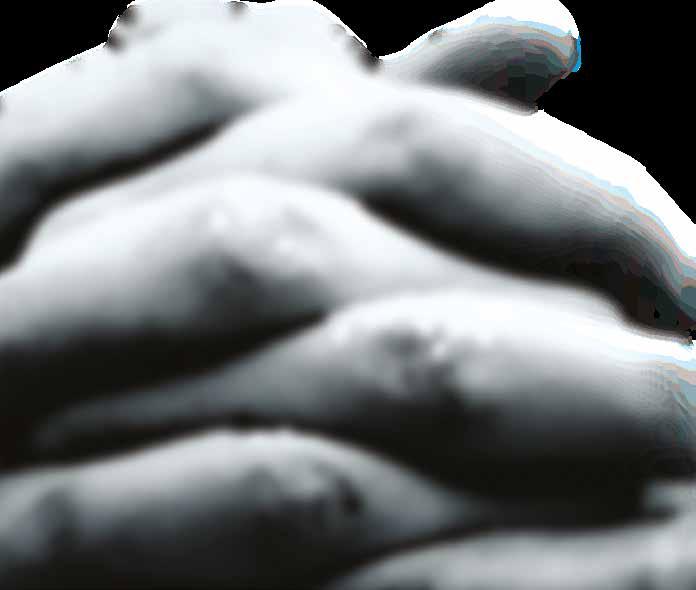







































To receive basic reading about Christianity and information about The Salvation Army, complete this coupon and send it to


War Cry 1 Champion Park London SE5 8FJ
Or email your name and postal address to warcry@salvationarmy.org.uk

















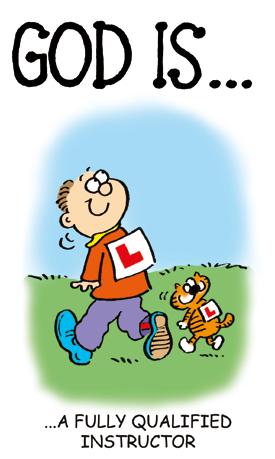
QUICK QUIZ
Who plays Lady Mary Talbot in the film Downton Abbey: The Grand Finale?
Which country has the words ‘In God We Trust’, printed on its currency?
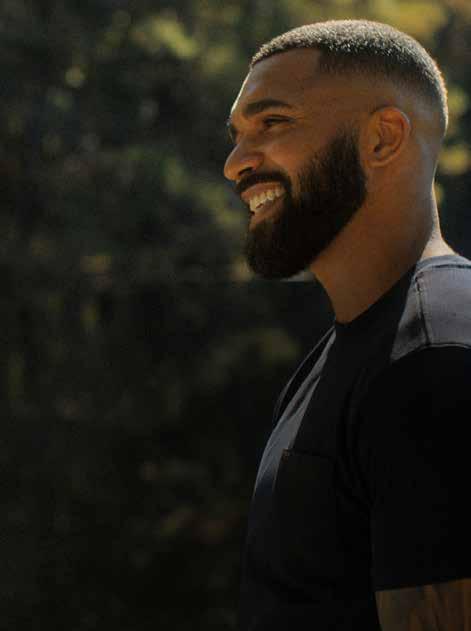
STORY LOVE
Not all love stories start with fireworks. Some begin with the tiniest spark. And that tiny spark is the focus of Ruth and Boaz, a modern-day retelling of one of the most powerful love stories in the Bible.
Ruth finds hope after tragedy
Film feature: Ruth and Boaz Netflix
By Claire Brine
The action begins in Atlanta, where rising hip-hop artist Ruth (Serayah) decides to step away from the glamour of the music scene in order to start life anew in rural Tennessee. There she takes care of her surrogate mother, a widow named Naomi (Phylicia Rashad), and lands a job picking grapes at a winery.
She also meets a kind man named Boaz (Tyler Lepley) – who could just be the love of her life. But their happy ever after isn’t guaranteed if Ruth cannot find a way to move beyond her past.
Reflecting on the story’s message for viewers, producer DeVon Franklin says that in tough times, ‘it’s so easy to get jaded. But this movie is about staying open, because when you open your heart, that’s when miracles can happen.’
It would be easy to forgive Ruth for being jaded at the start of her story as told in the Bible. She’s grieving the loss of her husband. As a young widow with no male relatives to provide for her, she doesn’t know what her future holds. But she promises to stay with her mother-in-law, Naomi, saying: ‘Where you go I will go... Your people will be my people and your God my God’ (Ruth 1:16 New International Version).
Who wrote historical thriller The Stolen Crown, about the succession of Elizabeth I?
What is the name of Bluey and Bingo’s mum in the Australian animation Bluey? 1 2 3 4 5 6
Who recently became the youngest male actor to win an Emmy award, for his performance in crime drama Adolescence?
What three colours feature on the Italian flag?
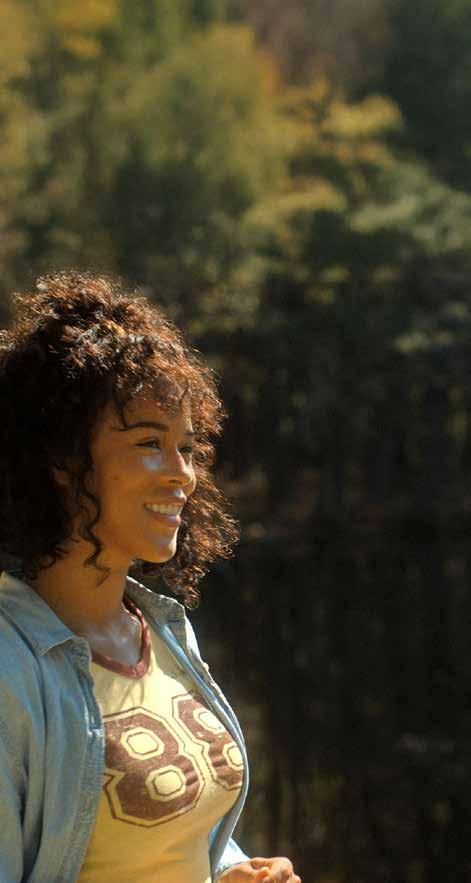
Though Ruth is heartbroken and uncertain about the days ahead, she puts her trust in God. And in ordinary ways, he provides for her. Every day, she is able to acquire enough food to eat by working in a field and gathering grain left behind by the harvesters. Later, she meets Boaz, the field-owner who ensures that no harm comes to her while she’s working. When the reaping season ends, Boaz marries Ruth, giving her a home. The couple have a child, bringing the family great joy.
Though written hundreds of years ago, the story of Ruth can inspire us today. It reminds us that in bleak times, God still cares for us. Through our pain, he restores us. And – in sometimes very ordinary ways –he provides us with a spark of hope for the future.

Quick CROSSWORD
1. Frighten (5)
4. Ban (5)
8. Yes (3)
9. Grade (5)
10. Hold tightly (5)
11. Part of a foot (3)
12. Immerse (5)
13. Vanity (7)
16. Swarm (6)
19. Mean (6)
23. Desired (7)
26. Striped horse (5)
28. High ___, fluorescant workwear (3)
29. Colour slightly (5)
30. Slip of memory (5)
31. Prosecute (3)
32. Bishop’s headwear (5)
33. Evade (5) DOWN
2. Separately (5)
3. Oriental (7)
4. Fault (6)
5. Pig meat (5)
6. Lift (5)
7. Power (5)
9. Venomous snake (5)

14. Feline (3)
15. Tavern (3)



3. Resistant to a particular infection 4. Place of business
5. Circus tent (3, 3)
6. Pull out of the ground
17. Scornful shout (3)
18. Employ (3)
20. Pushed against gently with the nose (7)
21. Male duck (5)
22. Recommend (6)
23. Capture (5)
24. Poison (5)
25. Give medical care to (5)
27. Two-footed animal (5)

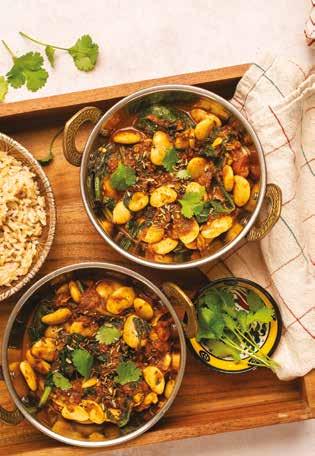
Butterbean and spinach curry
INGREDIENTS
1tsp olive oil
METHOD
3 garlic cloves, chopped
¼ ginger, chopped
1tsp fennel seeds
200g chopped tomatoes
1tsp cumin seeds
1tsp madras curry powder
1tsp garam masala
¼ tsp turmeric
½ tsp chana masala powder
400g butter beans
60ml cup water
100g spinach
Ground black pepper
20g coriander leaves, chopped

Heat the oil in a pan over a medium heat and sauté the garlic, ginger and fennel seeds for a few minutes, until fragrant.
INGREDIENTS
110g plain or wholemeal flour
75g salted butter, chilled
6tbsp oats
7tsp light brown sugar
2tsp vanilla extract
2 apples (or pears)
500g mixed berries (fresh, frozen or canned)





Add the tomatoes, cumin seeds, madras curry powder, garam masala, turmeric and chana masala powder. Stir well and simmer for 10 minutes, until the mixture has thickened.
Stir in the butter beans and water. Simmer for another 10 minutes, until the beans are heated through and the curry base has a gravy-like consistency.
Add the spinach and stir through, until wilted. Season with pepper, to taste.
Garnish with coriander and serve with brown rice.
Berry and oat crumble
METHOD
Preheat the oven to 190C/Gas Mark 5.
To make the crumble topping, put 100g flour into a bowl and cut the butter into small pieces on a chopping board.
Rub the butter into the flour. Toss lightly to keep the mixture cool. Add the oats, 6tsp sugar and 1tsp vanilla, then mix together.
Using the large holes on a grater, grate the apples, but leave the cores and dispose of them. Place the apple, along with the berries and the remaining flour, sugar and vanilla in a bowl and mix together.
Spoon the fruit into ovenproof dishes and sprinkle over the crumble topping.
Bake in the oven for 25 minutes, until the fruit is bubbling and the topping is golden. Leave to cool slightly, before serving.

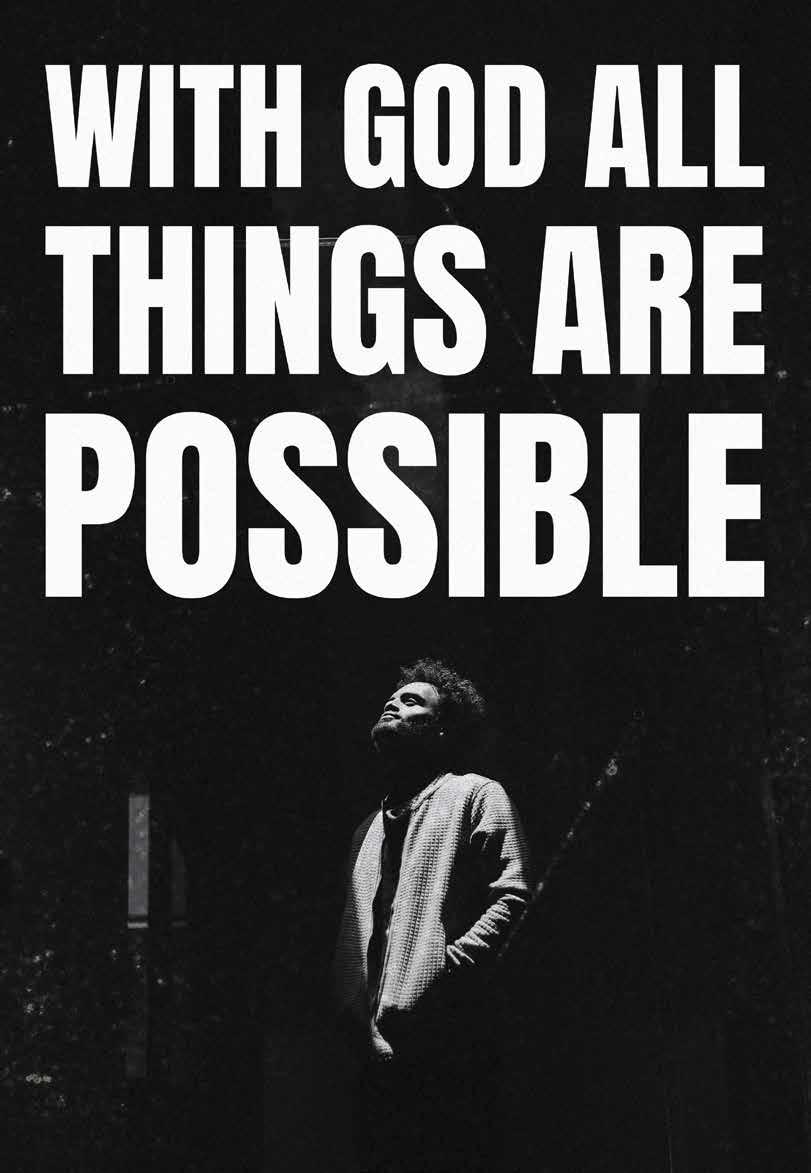
Matthew 19:26 (New International Version)
